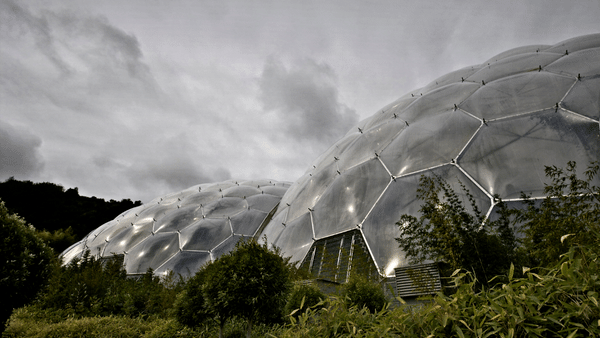Sustainability is a suspiciously neutral term that conceals our increasingly desperate desire to save the world from itself. I don’t think this is just my perception; an ambient low level desperation is palpable and ubiquitous now, and normal rules of conduct can no longer be taken for granted. For instance, the desire to defeat rivals and expand may be the lifeblood of business, but collaboration has to trump competition when the goal is a viable habitat for everyone.
And yet we often forget the subtle ways that competition and collaboration need each other. I was reminded of their relationship recently when my family sat down to a pub dinner close to a life size outdoor chess set. There were a handful of six year olds enthusiastically pushing pieces and knocking them over, saying: “Yeah! I love Chess! I win!” before absconding, excitedly chasing after each other. As a chess Grandmaster I felt weirdly uncomfortable, so with an oblique sense of social responsibility I scuttled over to set the pieces up correctly.
Kids will be kids, but what troubled me is that they thought they were playing chess. Their distorted idea of the game has parallels with widespread attitudes to sustainability, where the rules are rarely clear and the nature of competitive activity is poorly defined.
Unlike chess, where competition is zero-sum, Pandemic is an example of a cooperative board game that helps to focus the mind on what winning in the context of sustainability really means. The threat in Pandemic is the end of the world, and although the focus is public health, the same principles apply. The players have to cooperate to keep four virulent diseases under control and can only win or lose as a team that actively collaborates. In its emphasis on coordinating diverse forms of expertise (dispatcher, medic, scientist, researcher or operations expert) to address complex challenges, the game shares some overlaps with my view that climate change should be understood as problem with Seven Dimensions (science, law, technology, money, democracy, culture, behaviour).
The broader lesson is that when the pre-competitive conditions are clear you can compete and collaborate at the same time – indeed you have to. While large companies like Unilever, Kingfisher and Marks and Spencer promote sustainability as part of their brand strategy, the evidence, for instance in The Myth of the Ethical Consumer, is that consumers rarely make purchasing decisions on the basis of sustainability, even when they claim they do. Sustainability in business is typically about reducing costs, future markets and the resilience of supply chains; sometimes it’s a way of attracting ethically motivated employees, and often it’s a genuine commitment to corporate responsibility. In principle this all suggests great scope for collaboration and sustainability should be the ultimate pre-competitive issue. After all, no planet, no competition.
In this context the government’s recent decision to reduce support for renewable energy is vexing. The Secretary of State presented it as a good news story, saying that renewables can now ‘stand on their own two feet’. From a narrow competitive point of view that might prove to be true – although it feels disingenuous in the context of continuing fossil fuel subsidies. From a pre-competitive perspective however, renewable energy should not merely survive but gradually out-compete other forms of energy. There is a moral case for loading the dice. Shaping the ground rules for competition is the government’s prerogative and obligation, so it’s sad we appear to be doing it in the wrong way.
Yet even when a government takes their pre-competitive responsibility seriously, they face legal and social barriers. A particularly evocative case is the Dutch competition authority challenging the Dutch Energieakkord - a consortium of over forty organisations including government, employers, trade unions, NGOs and financial institutions. The Akkord wanted four energy companies to shut down five old coal fired power stations in a coordinated manner to cut CO2 emissions. Great idea, but apparently this action would breach competition law as it might increase the cost of electricity to consumers as a consequence.
That’s the front line of sustainability right there: a collaborative effort by a range of actors being overruled on the premise that competition is a trump card. This imperial view of competition combined with pre-competitive rules that fail to serve the interests of people or the planet is perhaps the defining quality of what people mean by ‘neoliberalism’, and it risks becoming further embedded in trade agreements like TTIP.
While competition law may not always proscribe collaboration between businesses, it does engender fear of perceived collusion or market manipulation, because the penalties for that are so high. This point is particularly important for efforts to build a circular economy, where the control of the value chain of a product is often widely distributed, and questions of ownership and control become murky.
So what to do? As Matt Prescott argues, pro-actively collaborative groups are emerging, including the WWF Global Forest Trade Network (established in 1991), the Roundtable on Sustainable Palm Oil (2004) and the Supply Chain Sustainability School (2012). More generally NGOs are encouraging businesses to collaborate on sustainability issues wherever possible, and a recent encouraging example saw major companies collaborate to ensure minimum wages were raised in the supply chain Cambodia.
A world without competition would be anemic and stunted, so let’s not go there. But a world without collaboration would be even worse; brutal and terrifying, so let’s avoid that too. We need to continue to develop organizational forms, cultural norms and legal principles that help to remind us why the Latin root of the word competition is com-petere; to strive together.
A revised verison of this blog was published on the Guardian website.
Dr Jonathan Rowson is Director of the Social Brain Centre at the RSA, a writer and chess Grandmaster. He Tweets @Jonathan_Rowson
Related articles
-
Climate justice: beyond the boundary
Adanna Shallowe
Do the commitments made at COP27 go far enough in protecting and regenerating our climate? The RSA's Senior Global Manager, Adanna Shallowe, shares her thoughts.
-
Capitalism and its many flavours
Andy Haldane
RSA Chief Executive Andy Haldane argues that capitalism has an important part to play in the flourishing of people, place and planet.
-
Life-centric from human-centric: a shift in mindset
Roberta Iley
In our second Anthropy round-up blogs, Head of Regenerative Design, Roberta Iley, links the discussions she took part in at the Eden Project with our new capabilities enquiry.



